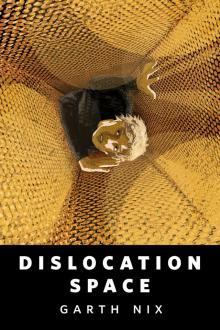Dislocation Space Read online
Begin Reading
Table of Contents
About the Author
Copyright Page
Thank you for buying this
Tom Doherty Associates ebook.
To receive special offers, bonus content,
and info on new releases and other great reads,
sign up for our newsletters.
Or visit us online at
us.macmillan.com/newslettersignup
For email updates on the author, click here.
The author and publisher have provided this e-book to you without Digital Rights Management software (DRM) applied so that you can enjoy reading it on your personal devices. This e-book is for your personal use only. You may not print or post this e-book, or make this e-book publicly available in any way. You may not copy, reproduce, or upload this e-book, other than to read it on one of your personal devices.
Copyright infringement is against the law. If you believe the copy of this e-book you are reading infringes on the author’s copyright, please notify the publisher at: us.macmillanusa.com/piracy.
The young woman was short, not quite five feet tall, and very slight, though this was disguised by her over-sized black coat with its white patch on the shoulder, her camp identity “Kh-112” indicated there in fading blue paint. Her pale blonde hair was cut very badly, very short. It looked as if it had been hacked off with a knife, because it had been.
She carried her hat, which was little more than a bundle of stitched-together rags, and her rough padded mittens were thrust through the rope she wore in place of a belt. She had not removed the ragged wraps she wore around her hands for extra warmth, nor taken off her felt boots when she had entered the HQ hut, even though it was much warmer than outside.
It was thirty below zero outside, but the sun was up and the air was still, in camp terms a beautiful winter day. In the distance, the roll call could be heard, the guards counting the prisoners by fives in their teams before they were marched out to the forestry work area.
Two guards had brought the woman in, because that was the rule with this particular prisoner. Tough Siberian men, each twice her size and weight, but even so they kept their distance and held their plaited leather goads ready, and watched the woman as if she was something swift and venomous, to be constantly observed. They did not have their submachine guns or pistols, because that was another rule with this prisoner. She was never allowed to be within a dozen paces of a firearm.
If the guards had dared, they would have shot her and been done with it. But there were a lot of special rules about Kh-112, and one of them was that she be kept ready to be presented to important visitors from Moscow, who could turn up at any time, without notice. No one knew why this was so, or what might happen if she could not be presented, or was visibly injured or evidently maltreated. Which was to say maltreated beyond the usual scarcity of food, rest, warmth, and medicine that was the baseline of camp existence.
Anyone responsible for breaking the special rules would be forced to take the prisoner’s place in the camp. Even worse, there was the likelihood of collective responsibility: they might all be punished. This was not to be risked. All the guards, warders and trusties watched each other’s behavior with Kh-112.
None of the camp warders were in the HQ hut, which was very unusual. An abandoned game of chess, a half-eaten loaf, and a partially chewed sausage indicated they had been there until very recently, warming themselves as usual by the well-stoked stove, and had been unceremoniously kicked out. Not even the warders would leave food behind voluntarily.
Instead of the usual guards, there was only the Major, the disciplinary officer for the women’s side of the camp, who was almost unrecognizable in full uniform, complete with greatcoat, rather than her regular sheepskin coat. She too, had left her pistol behind, the holster flap at her side yawning open. But even her appearance was not the most surprising thing that day.
There was a civilian present. He still wore his thick fur coat and hat despite the heat of the room, evidently a new arrival to eastern Siberia, who did not know true cold. He was fortyish, and bald, and his eyes were weary behind his gold-framed spectacles. He sat on the only chair, looking up at Kh-112, a dossier open on his knees. Her dossier, as indicated by the faded photo pinned to the top corner.
An officer stood near the civilian, presumably of State Security, for no others ever came to the camp. But the shoulder boards on his thick, fur-collared greatcoat were a curious orange, not blue, and his rank insignia were neither of the MVD nor the Red Army. There was a large, leather suitcase by his feet and he held what at first glance looked like a small wooden crate, for oranges or perhaps lemons, but the bottom had been knocked out of it, to make it a cube open on two sides. His holster was not empty, though it was clasped shut.
The civilian spoke, his voice warm and casual, not the sharp bark of a command.
“Comrade Captain Aleksandra Vasilyevna Levchenko.”
The guards and the disciplinary officer exchanged swift, furtive glances. The zeks were never addressed as “comrade”, and most definitely never allowed any of their former ranks or titles. They were known by a letter and a number, that was all.
The young woman did not respond. She stood easily in the centre of the room, completely still, only occasionally blinking. It was hard to tell if she was even breathing.
“Comrade Captain Aleksandra Vasilyevna Levchenko.”
“She doesn’t talk, Comrade Academician,” said the Major. “She has not spoken since she arrived here. At least not to us.”
“Has she lost her wits?” asked the civilian. He sounded anxious, even upset at this possibility.
“No, sir. She simply chooses not to talk.”
“And you allow this?” asked the strange officer.
“Kh-112 is a special prisoner, under a directive from … the office of the General Secretary,” replied the Major, cautiously attributing the order to the office of the Great Man rather than to Stalin himself, just in case some revisionism was in play. Though the original orders bore Stalin’s signature this might be better forgotten. The visitors had arrived with a paper with that same signature, but all it had said was to obey their every instruction. “She does her work, she causes no trouble, we let her be.”
The Major did not mention the few occasions when new or particularly stupid guards had sought to evade the special directives, had not let Kh-112 be, and had suffered for it. But what was three or four deaths, or maybe five, when they had brought it on themselves?
“I see,” replied the civilian, who from the title accorded by the Major was perhaps a doctor, or a scientist of some kind. He addressed the prisoner again.
“Comrade, perhaps you can incline your head to acknowledge that you are in fact Comrade Captain Aleksandra Vasilyevna Levchenko?”
The prisoner nodded once, slowly.
“Parts of your dossier are missing or incomplete,” said the Academician. “Records have been destroyed by criminal elements. Errors have been made, including your arrest and sentence. Those responsible have been punished.”
The prisoner nodded once again, even more slowly.
“We have been looking for you for some time,” continued the civilian. “There is a great service you can do for the Motherland. Even more important than the work you have already done at Stalingrad, and Kursk, and the final battle for Berlin.”
The thinnest of smiles spread on the prisoner’s mouth. Everyone present knew what was what. The State needed her for something, and so her arrest and imprisonment were suddenly mistakes. If she had not been needed there would be no talk of mistakes.
“You will be compensated for your temporary absence,” continued the civilian. By “temporary absence” he meant the four ye
ars as a prisoner in the camps, first at Norilsk and now at Kolyma. “Reinstated at your rank, with full back pay.”
He hesitated for a moment.
“But the work you will do … it requires you to communicate. To talk.”
“I talk if there’s a need for it,” said Aleksandra Levchenko, with a shrug. She spoke easily, as if among friends, drinking. “Who does Koba want me to shoot now? Someone else on the Central Committee?”
The Major made a choking noise. The guards’ faces froze as if their expressions could indicate they heard nothing, knew nothing, would remember nothing. Only the Academician and the strange officer acted as if what she said was of no importance, that she should so casually call Comrade Stalin by his nickname and mention shooting members of the Politburo.
“It’s not a shooting job,” said the civilian. “I am … Professor Lev Sergeyevich Termin. This is Science Investigator Ignat Vasilievich Shargei.”
“Not a shooting job?” asked Aleksandra. She walked to the bench near the stove and sat down, ignoring the guards’ nervous starts and the Major’s hand clutching at the flap of her empty holster. She took a small, roughly stitched pouch from the top of her boot, opened it to gather a piece of newsprint and a careful pinch of tobacco, and began to roll a cigarette.
Aleksandra was, or at least had been, a killer. A sniper first and foremost, though not only that. Her official tally was 190 confirmed kills, though she had certainly killed many more people. The Germans at Stalingrad had called her Todesgeist, the Death Ghost, for her ability to reach impossible firing and ambush positions, squirming through rubble and ruin, climbing up chimneys and factory ducting, progressing along sewers too small for humans to pass, dragging her rifle behind her. Or sometimes just taking a knife, and picking off sentries one by one …
Professor Termin looked at the Major and jerked his head.
“You may leave us. Take those two with you.”
“Comrade Academician, are you—”
“If she wants to kill us, I doubt you or they could do anything about it,” said Termin wearily. He looked directly at Aleksandra, taking off his glasses so she could see his eyes clearly. “But I think you would do better to leave with us, don’t you, Comrade Captain?”
“I don’t know,” said Aleksandra thoughtfully. “If it’s not a shooting job, what is it? And have you anything to drink?”
Termin waited as the Major and the guards left. The officer with the strange rank of Science Investigator knelt down and opened the suitcase. He took out the bottle of vodka that rested on the pile of uniform clothes inside and tossed it over to Aleksandra. She caught it easily and smiled. A real smile this time, as she glanced at the label.
“The good stuff. And I thought Comrade Stalin had finally decided to have me shot.”
“As I said, there was an error—”
“Spare me,” spat Aleksandra. She laid her newly rolled cigarette carefully down on the bench next to her, drew the cork from the bottle with her teeth, and took a deep draught, rolling the vodka around in her mouth, her eyes half-closed in deep satisfaction. But only half-closed. Termin and Shargei noted the brilliance of those lidded eyes, still watching them, alert to their every movement.
Aleksandra set the bottle down, used the toe of her boot to swing open the stove door and lit a stick of kindling from the box at the side to ignite her cigarette.
“The job?”
“It is … a question of access,” said Termin. “Tell me, you have been here some time. You do not seem greatly debilitated by the … uh … environment, but are you still able to perform your contortions?”
Aleksandra took up the bottle and had another swig of vodka, ignoring his question.
“Are you?” asked Termin again.
“Perhaps,” said Aleksandra. “That box represents the dimension of whatever I need to get through?”
She made her mouth strangely, almost obscenely, quadrilateral and blew a smoke square rather than a ring, and then another through the first. “A cube about thirty centimetres a side?”
“Thirty-one point one five centimetres,” said Shargei, lifting the open-ended box like a prize exhibit, though he did not stop watching the strange smoke square drift across the room.
“Why should I do this job for you?” said Aleksandra softly, almost to herself.
Termin scratched his nose and looked at the floor. Shargei put down the box. Aleksandra watched him. She held the bottle negligently, but she could smash it on the stove in a second, slash both men’s throats … and she wasn’t fooled by Shargei’s “Science Investigator” title.
Shargei didn’t unbutton his holster, as she’d thought he might be stupid enough to do, to threaten her directly. Instead, he reached inside his coat and removed a small buff envelope. He held it out to Aleksandra. She put the bottle down again, took another puff of her cigarette, licked her fingers to pinch it out, returned the stub to her boot-top, and then took the envelope.
There were four photographs inside. Head shots, but not Lubyanka or camp portraits.
Aleksandra’s father and mother, her older sister, and younger brother. They looked older than when she had last seen them, but not visibly hurt, injured, or terrified.
“They are not in camps, they are not prisoners, they continue to live their lives,” said Shargei. He smiled, but his eyes were cold. Whatever his shoulder boards proclaimed, Aleksandra knew him for what he was, and she received his unspoken threat as to what would happen to her family if Aleksandra did not agree to do whatever it was Shargei and Termin wanted her to do. It was the old lever, thrust into position once again. Ever reliable, to move the world, or just one person.
“Do I come back here after?” asked Aleksandra. “To finish my tenner?”
She had been sentenced to ten years in the camps, but knew it was unlikely she would ever be released. Everyone got ten or twenty-five years, but the former was notional, it simply meant “at least ten” and anyone who got twenty-five knew it was effectively a death sentence.
“Who knows?” answered Shargei. “Maybe not. And while you do the job for us, you’ll have special treatment. And your family, too.”
Again, there was an unspoken threat in his words. “And your family” echoed in Aleksandra’s mind. She had heard the phrase before from Security Service officers.
Aleksandra slid the photographs back in the envelope, and the envelope up her sleeve. This was how it worked. She could kill these two, but even if she escaped direct retribution herself, her loved ones would pay for it. Just as Aleksandra could have escaped the camp, in summer at least. But she was kept here, by fear. Not for herself, but by what would happen to her family in retribution for anything she did.
There was no escape. Little hope, save that if she could continue living, anything might happen. Like the story of Nasreddin and the Sultan’s horse. Stalin might die. Aleksandra might die. Maybe she would even be set free.
“So thirty-one point one five centimetres,” she said. “Put the box over by the wall.”
Shargei placed the box as instructed.
“Stand over by the other wall. You too, Professor.”
Aleksandra went to the door and lowered the bar. The hut had only one window, small and high up, the glass grimy with smoke. But weak sunshine streamed through it, little tainted by the grime, putting the light from the hanging lantern to shame.
“Don’t get excited,” said Aleksandra. “This is serious work, and I don’t like gawping men.”
A tiny knife fashioned from a piece of saw-blade, utterly forbidden in the camp and previously unseen, flashed in her hand. She made a groin-high cutting motion, before the knife vanished again.
“Understood,” said Termin.
Shargei nodded.
Aleksandra undid her rope belt, took off her coat, jerkin, felt vest, smock and undershirt, padded trousers, and drawers and laid them in a careful heap. There was no fat on her anywhere, even the little she once had long dissipated by the lack of food in the
camps. Naked, she was incredibly wiry and muscular, but also somehow otherworldly, or elfin.
“It would be better if I had my rifle to drag behind me,” she said, lying down on her stomach, facing the open end of the crate.
“You won’t need a rifle,” said Termin.
“I’m used to it,” replied Aleksandra. “It helps me, psychologically.”
This wasn’t true. But it might lead to her getting a rifle.
She eased forward, putting her head into the box, and at the same time, smoothly and easily dislocated both her shoulders. She continued to move, undulating like a snake, and within seconds was through the box and out the other side. Her arms moved back into position with only the faintest audible click, and she stood up, flexing her fingers. She poked out her tongue and picked up the tiny knife she’d held there, though neither Termin nor Shargei had seen her put it in her mouth.
“Well? Do I pass?”
“Yes, yes indeed,” said Termin. “Wonderful! Even better than…”
His voice trailed off.
Aleksandra cocked her head to one side. The tiny knife moved through her hand as if it had a life of its own, rolling over and around each finger, and back again.
“Better than who?”
“You’ll be told more as required,” said Shargei. “We must go. Your uniform is in the suitcase.”
He slid the suitcase towards her with a grunt.
“Other clothes. Everything you need.”
“I want a pistol,” said Aleksandra. “It goes with the uniform, no?”
“Don’t be stupid,” said Shargei. “Get dressed.”
She quickly dressed in the clean clothes from the suitcase. Her uniform tunic was pressed, laid down in tissue paper, and even had her Hero of the Soviet Union, Order of Lenin and campaign ribbons. But there was no chocolate brown leather holster for a Tokarev TT-33, as there should have been. “Where are we going, by the way? Somewhere warm, I hope?”
“A little warmer than here,” replied Termin. “Still Siberia. Some five thousand kilometres west. But we have an aeroplane.”

 The Ragwitch
The Ragwitch Newt's Emerald
Newt's Emerald Grim Tuesday
Grim Tuesday Sabriel
Sabriel Mister Monday
Mister Monday The Missing
The Missing The Fall
The Fall A Confusion of Princes
A Confusion of Princes Troubletwisters
Troubletwisters Lirael
Lirael Lord Sunday
Lord Sunday Clariel
Clariel Drowned Wednesday
Drowned Wednesday Shade's Children
Shade's Children The Violet Keystone
The Violet Keystone Abhorsen
Abhorsen The Monster
The Monster The Creature in the Case
The Creature in the Case To Hold the Bridge
To Hold the Bridge Second Round: A Return to the Ur-Bar
Second Round: A Return to the Ur-Bar Above the Veil
Above the Veil Aenir
Aenir Mystery of the Golden Card
Mystery of the Golden Card Superior Saturday
Superior Saturday Sir Thursday
Sir Thursday Castle
Castle Lady Friday
Lady Friday Into Battle
Into Battle Dislocation Space
Dislocation Space Sabriel (Old Kingdom Book 1)
Sabriel (Old Kingdom Book 1) Sir Hereward and Mister Fitz Go to War Again shamf-1
Sir Hereward and Mister Fitz Go to War Again shamf-1 The Left-Handed Booksellers of London
The Left-Handed Booksellers of London Novel - A Confusion of Princes
Novel - A Confusion of Princes One Beastly Beast
One Beastly Beast A Suitable Present for a Sorcerous Puppet shamf-3
A Suitable Present for a Sorcerous Puppet shamf-3 Beyond the Sea Gates of the Scholar Pirates of Sarsköe shamf-2
Beyond the Sea Gates of the Scholar Pirates of Sarsköe shamf-2 Have Sword, Will Travel
Have Sword, Will Travel Fire Above, Fire Below
Fire Above, Fire Below Nicholas Sayre and the Creature in the Case
Nicholas Sayre and the Creature in the Case The Monster (Troubletwisters)
The Monster (Troubletwisters) Across the Wall
Across the Wall Let Sleeping Dragons Lie
Let Sleeping Dragons Lie![[Abhorsen 03a] - Across the Wall Read online](http://i1.bookreadfree.com/i2/04/12/abhorsen_03a_-_across_the_wall_preview.jpg) [Abhorsen 03a] - Across the Wall
[Abhorsen 03a] - Across the Wall